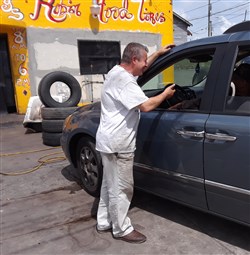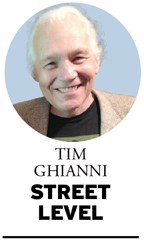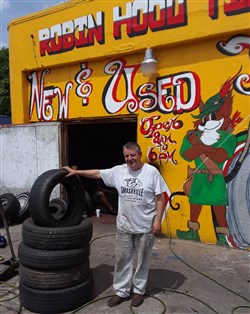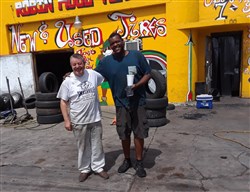VOL. 43 | NO. 26 | Friday, June 28, 2019
Palestinian pharmacist makes life in US selling used tires

Robin Hood Tires owner Tawfiq Ghanem has become a part of the North Nashville community. Here one of his regular customers stops by the business just to greet the man who grew up on Israel’s war-torn West Bank.
-- Photo By Tim Ghianni |The LedgerRolling the car past a pack of eight young men stealing slight shade by leaning against a quick stop market on a 90-plus-degree afternoon, I pull into the used tire store just across the street from them on the northeast corner of the D.B. Todd-Buchanan intersection.
I figured if I was lucky I’d find someone here who could answer my long-standing question as to why the used tire trade flourishes on this sometimes-intimidating inner-city stretch.
Instead I discover an oasis, a sanctuary of humanity, a place where the owner has finally found – and dispenses – peace after escaping the violence and uncertainties of his home on the West Bank.
“I’ve been 23 years in Nashville, 10 this has been my store,” says Tawfiq Ghanem, 50, after I meet him behind some grease-stained plastic sheets that attempt to trap the refrigerated air inside his small office that’s lined with photos of vintage roadsters and filled with love and tires.
“I am from Jerusalem,” he says. “Palestinian. I came here to Nashville because I had a friend who was in the pharmacy business like me back home. He was five years older. My BFF, you know.
“Shuwab Sayori (that pal) came in 1990 to Nashville. He’d tell me ‘Come over here and get your pharmacy degree. Life is better, away from all the war and fighting.’”
Like his pal Sayori had been before moving to the States, Ghanem already was a pharmacist on the West Bank, and he knew he’d have to “start from scratch” to earn his pharmacy license here. But this move offered him something more important than professional advancement: The illusive peace he’d never been able to enjoy while growing up in that historically troubled, often violent, part of the world.
“I came here in 1995 to finish pharmacy in the U.S. I got my degree in biochemistry and pre-pharmacy at MTSU,” he says. “I find my friend here selling cars, not in pharmacy. He’s selling cars now in Texas and invests in the stock market. We stay in touch.”
He scans his office, which is also one of his storage rooms for stacks of tires, different sizes and tread, like the countless others in tidy piles around his lot and in at least one of the bays of the former gas station.
“While going to MTSU, I bought this business,” he recalls. His education at that point only qualified him for a $7.50-an-hour pharmacy tech job at one of the major chains. Not enough to raise his family.
“I was going to get a job, but I decided instead to stay in the tire business, buying and selling tires, cars, other things,” Ghanem continues. He prefers to be called by his last name, one which has earned love and respect throughout this mostly black neighborhood.
Later in the lazy, hazy summer afternoon spent with him, a young man with two children approaches Ghanem as he and I stand on the parking lot asphalt, watching the traffic flow.
That young man doesn’t call Ghanem by his name as the two grasp hands, hug and pat each other on the back.
“How you doin’, Mr. G?” asks the young man, who walks up D.B. Todd, his two children or perhaps much-younger siblings, following his every step into the steamy afternoon. Occasionally, they look back over their shoulders at the beloved “Mr. G.”
“He’s one of my regular customers,” says Ghanem after the young man departs, his vacated spot in the parking lot quickly occupied by a van that rolls off D.B. Todd.
The tire man from Palestine turns to greet that driver, exchanging happy banter and shaking hands, which seems to be all the visitor is seeking on this suffocating urban Nashville afternoon.
As often has been the case throughout my 45 years of writing columns for newspapers – some are dead and some are living – I had climbed in the car on this afternoon without really knowing a destination.
I only knew the direction: I wanted to go into North Nashville, where I have found friendship and warmth through the decades. It is an area that has been – at least until the white developers began demolishing the comfortable neighborhood cottages – largely ignored by the media unless there is a good shoot-out or a big drug bust. Used to be a big place for headline-grabbing numbers raids, but the industry of separating suckers – many of them poor – from their hourly wages has been taken over, or at least dominated by, the state lottery. Apparently, it’s OK to take from the poor in the name of progress, but that’s a story for another day.

Someone breaking ground on tall-skinnies or condos for mostly white It City invaders does get press coverage, of course, with praise heaped on the builders and the young professional settlers who occupy this historically black territory after longtime residents, priced out by rising rent and property taxes, uproot their lives and scurry out to Antioch or up to Springfield and Clarksville.
While circling blocks and neighborhoods for this column, I stayed away from the new gentry developments and stuck to the historic reality of this part of the city, still (for now, at least) mostly occupied by hard-working black men and women, who religiously build their lives around their churches and families while looking out for their neighbors. Yards often are filled with flowers nurtured by hope rather than despair. Oh, tomato plants, too. And tricycles.
As normally is the case on these slow-speed rambles about our city, I draw a lot of anxious and possibly angry stares from pedestrians, porch-sitters and the men and women inside the steadily rolling fleet of cop cars. They seem to be tracking my process, either protecting or suspecting.
After a couple of hours and a few of stops that don’t work out as column topics, I pull into Robin Hood Tires, a brightly painted brick fortress that has – as long as I can remember – been a used tire joint.
“How you doin’, boss man?” asks a young black man as I climb from the car outside the former service station. “Can I help you with anything?”
I explain who I am, that I’m mostly harmless and that I’d like to talk with the boss. The last time I stopped here, many years ago, a big, white man with a pistol called himself “the boss” and didn’t want to be interviewed. So I’d never had my curiosity about this neighborhood of used tire commerce answered, though I’m sure it’s a good business since four or five similar joints are within a couple blocks.
What sets this one apart is the relatively new, eye-catching, mostly yellow paint job.
The young man leads me inside the Robin Hood building and to a doorway “blocked” by a dozen or more wide, vertically hanging strips of thick, clear plastic.
“Come on in,” says a voice, urging me to duck through the plastic sheets to his office where he presides over the business – and celebrates the peace he could not find on the West Bank – inside this concrete bunker at D.B. Todd and Buchanan, just across the street from where my friends at Ed’s Fish & Pizza (which does not serve pizza) fry up the best fish sandwiches in Nashville.
The beckoning voice I heard comes from the cheery man behind the desk, Ghanem, who explains it took him awhile to get accustomed to living in Nashville after his years among his Palestinian brethren and their Israeli foes.
“When you learn English (as he did as a child) but you don’t use it, it is hard to communicate with people at first,” he says, as if offering an apology for what turns out to be his excellent command of my native language.
He leans back in his chair, where he is only interrupted a few times during the next hour or more, when his two employees need to make change or ask a question of the guy to whom they show affection and respect.
“I sell used tires. I buy cars, sell cars, whatever I can do to make money,” says Ghanem, his Smashville Predators T-shirt displaying black smudges that prove he’s not above working among the changing tires and grease.
“I’m married, got five kids all born and raised here,” he adds. “My wife went to TSU. She was an English major. She graduated with honor. Psychology and Spanish minors.”
He met his future wife on a trip back to Palestine in 2000, not long after he had become a U.S. citizen. They were engaged and he returned to the West Bank in 2001 for the wedding.
“Her name is Areej Dwikat,” he says. “I don’t believe in changing a woman’s last name from her family name.
“A family raises a kid for 18 years, and when she gets married, she should keep her name. To change that name is not fair to the family. Doesn’t show respect.”
He adds that, in addition to raising the family, Areej teaches Arabic to children whose families came from the Middle East but who don’t know the language of their ancestry.
He shrugs when I ask him why he’s not in the pharmacy business here after managing three different establishments in Israel’s occupied territories.
“If you are in medical business or pharmacy somewhere else, like back home, you can’t practice here. You have to start over here.
“You have to get your degree in the United States, get trained in the United States and pass the test in the United States,” he explains.
The interest in pharmacy has not disappeared from Ghanem’s plans. “I think next semester I go to Lipscomb (University) and finish my pharmacy degree,” he says. “I’ve already been interviewed by a lady there.
“I think I go and enroll in the three-year program there.”

With its bright colors, lettering and cartoon artwork – painted by a local college student – Tawfiq Ghanem’s Robin Hood Tires brightens the intersection at D.B. Todd and Buchanan.
-- Photo By Tim Ghianni |The LedgerHe’s not giving up his used tire business, though. Instead, he points toward the shop, where his two loyal employees are keeping business going smoothly while the old journalist with the white ponytail distracts the boss.
“Since I have my boys to watch over the business, I can go to pharmacy school.”
His two longtime employees, Ron Pits and Antoine “Twan” Whitfield “want to work hard, want to live …. They started with me like they were young age.”
They’ll be able to handle the daily workload when he goes to school, but he’s not going to disregard his business.
“I got to live,” he says. “I got to pay bills. I got to stop by every day to make orders and make sure everything stays in place. You got to supervise.”
His plans are not in big, corporate pharmacy businesses, like Walmart, Walgreens and CVS “unless they pay me enough.”
“For me, as a pharmacist, I want to be independent. You need to have management experience in your own business, and I managed three different pharmacies. One of them was Holy Land Pharmacy in Ramallah.”
He also worked at Dream Pharmacy and Haya Pharmacy in Nablus.
Nablus is about an hour outside Jerusalem and “is one of the biggest cities on the West Bank. Ramallah is about 10-15 minutes from downtown Jerusalem.
“To have an individual pharmacy you need your degree. One-hundred thousand dollars would get you in the door of any pharmacy back home.
“But back home everything is cheap,” Ghanem explains. “Back there 15 or 20 shekels – about $5 – will get you in to see the doctor. You can walk in, and you don’t need an appointment.
“Back home, you can walk into any pharmacy, without prescription from the doctor, and get any medicine you need, except the ones that are addictive. Those you have to get a prescription from the doctor.”
If things are so cheap over there and he already was something of a business success, I am curious as to why he’d yank up his roots, move away from all of his family on the West Bank and chase his dreams on a worn, urban corner of North Nashville.
“Over there I only made $500 a month and I worked from 8 a.m. until 10 p.m. every day,” he says of his West Bank pharmacy jobs. “As a single young man, that wasn’t enough to get married, raise a family, buy a house and take care of my parents.”
He has been able to do all that here in U.S., thanks to his success in the used tire business and other side ventures.
Most important to him though is that he has found peace, even in this roughest part of Nashville. He feels comfortable and safe, something he never felt when living in the shadow of Bethlehem and Jerusalem, the sacred city to the three major religions.
“War,” he says, shaking his head. “We fight for my whole life. I live there until I was 27 years old, and there never was hope of peace being restored.
“The Jews want the land. Palestinians want our home. The Jews got the power of the U.S. behind them. We don’t got nothing, no hope to get our homes back.
“It’s a liberation and occupation war, with Jews trying to settle Palestine and Palestinians trying to keep their homes,” he adds.
“I got friends who are Jewish,” he says, adding that his homeland long has been part of Israel, but “it’s been called Palestine, Palaestina, since the beginning of existence.”
Palestine, he says, has not been erased, it lives on in the homes of the people who historically have called the area between the Dead Sea and the Jordan River home.
“It is a religious war,” he notes of the never-ending turmoil. He abhors the violence from both sides, and he loves the peace he has secured on this ultraurban street-corner.
He illustrates the West Bank situation by describing a visit home a couple of years ago, when his children were exposed to the strife that had been part of his young life.
“My kids were raised in the U.S.,” he says, adding that they didn’t understand what happened on the day he drove them to his hometown, Beita, a village of 16,000 that basically is a suburb of Nablus. “Most of the people there are like farmers. Everybody knows everybody.
“A (Jewish) settler had got killed. A lot of settlers were blocking the road. I told kids ‘go beneath the seat: Someone gonna shoot at us or throw rocks.’ Kids don’t understand.
“The settlers wanted to damage Palestinian cars. An Israeli soldier came and put an M-16 in my face.”

Tawfiq Ghanem – they just call him “Ghanem” or occasionally even “Mr. G” around his North Nashville neighborhood – and one of his longtime employees, Antoine “Twan” Whitfield. “He has given me new ideas and helped me think of new opportunities,” says Whitfield, praising his boss.
-- Photo By Tim Ghianni |The LedgerThat didn’t really upset Ghanem much. He showed his paperwork and pointed to his kids in the back. “I have kids,” he told the soldier. “We come here on vacation.”
The soldier told him “Drive slowly and nobody’s going to damage your car ….”
“Life there is tough,” Ghanem continues. “You could get killed because you are a Palestinian.”
With this brightly painted corner of North Nashville as his headquarters, he has fashioned a safer and more hope-filled life for his wife and their offspring, a 16-year-old daughter, twin 13-year-old girls, a boy who is 6 and another boy who is 10 months old.
“We have lived in the Priest Lake area since 2015,” he says, proudly. “Between me and the lake is the main road. I take the kids to swim and have a good time there at the lake all the time.”
A tall gentleman comes into the office to say hello to Ghanem. He doesn’t give me his name, but he attests to the kindness, generosity and professionalism of Mr. G and his two employees.
“I got a nail in my tire way out on Gallatin Road and I drove over here to get it fixed,” he says. “This is the only place I’d go.”
He nods toward Ghanem. “He’s a good man.”
After the tire is fixed and the man departs, the used tire merchant smiles. “I bought a tire here back in 1995, long before I owned this place,” he says. “I came here because I knew this area sell cheap tires. It’s a poverty area. People are poorer and they need cheap tires. Black people. Working people.
“I was scared in the beginning. I came in here and the owner was sitting there in the front office, with a pistol in front of him. I understand why he had that gun in front of him.”
Sure, not everyone in the neighborhood rolls out the welcome mat. I personally felt uncomfortable seeing the flock of young guys, aimlessly spending the hours and eyeing passersby from the shade of the quick stop market across Buchanan.
My apprehension is deepened by experience as a journalist. Many years ago I went to that quick stop on a Saturday morning, hours after the clerk had been gunned down by a robber. Police were gone by the time I got there, and the clerk’s replacement – I believe he was a cousin – worked the register, sold rolling papers, malt liquor and chewing gum … and hoped he didn’t get shot. He pointed out the bloodstains on the floor.
It’s not that Ghanem has not experienced the unsavory from this corner, either. “I had to call cops every day for the first year I was here,” he says, remembering his early days of ownership back in 2009.
“People try anyway they can to get a free tire,” he points out. “They try you.
“Some pulled a gun on me. Some pull knife,” he says, adding that those incidents did not lead to violence or even a robbery he’d report. “I just talked them down. Tell them ‘to kill someone for $10 or $15 is not worth it.’ I made it peaceful.
“You need to know how and when to avoid a problem. You need to study business, so you know how to deal with people. It took me about three or four years, but then everyone started calling me by my own name.
“They know me now for 10 years. I am part of their family.
“If someone comes in here for air and he can’t afford it, I give it to them. If I feel you are in need, I’ll help you. Most of the customers come in here and tell my boys ‘I want the boss, himself’ to wait on them.
“I have workers here from their own race,” he says. “Color does not mean nothing here. Only thing that matters is be honest, don’t lie, you say the truth. I tell my boys ‘if you are honest, you don’t steal and you take care of the customers, you got the job.’”
He looks toward the stacks of tires in his office. “I have cheap prices. Necessary poverty prices. I’d prefer to get less money and sell more tires. Other people prefer to sell to less people and make more profit.”
His business strategy and success is based on simple geometry (in addition to ethics and kindness.)
“The base of the pyramid is poor people. That’s the majority. They can hold you in business. The narrow part of the pyramid is rich people. You don’t need them.”
His pyramid-base-dwelling customers are as loyal to him as he to them.
“We don’t look to them as a dollar, but as a human,” he says, adding that he and his crew sell 10-15 tires a day. Whatever the customer’s needs, regarding their old tires or some good used ones, he and his guys take care of them. “Some just want us to put the doughnuts on,” he explains of customers who cannot at that point afford even a good, used tire.
“As far as we can, we will help you,” Ghanem adds. “We are cheaper than anywhere else. Way cheaper.
“Our business is in a poor area, and we are where they need us. This is where they live. I see them every day.”
While that long-ago owner kept a gun visible, Ghanem is unarmed. “I hate weapons. I don’t support weapons to be in the street, because you get mad, you take somebody else’s life.
“Police tell me ‘Ghanem, why don’t you get a weapon?’”
He shrugs. “Money goes in your back pocket. But a human, if he goes, he never comes back.
“And imagine if I was carrying a gun, it would scare the customers. They wouldn’t come back. They would think this is a bad neighborhood.
“If you come to a customer with a nice way of talk, you don’t need guns or bullets to solve a problem.”
He saw way too much of the bullet solution by both sides in his homeland, where the differences are sparked by religion, “but we all worship the same God. We worship Allah, but that is what we call God.”
“You know Jesus is Palestinian. Mary dressed like a Palestinian,” he says, with a bright smile.
Ghanem, who got his real estate license in recent months, loves this neighborhood and its people.
He, more than many of us who were born here, understands how wonderful are the many opportunities offered by living in the United States, in a land of relative peace.
“In the U.S., you make your own way, live decent. You can prove yourself. You have life and respect and a decent place to live.
“And peace.”